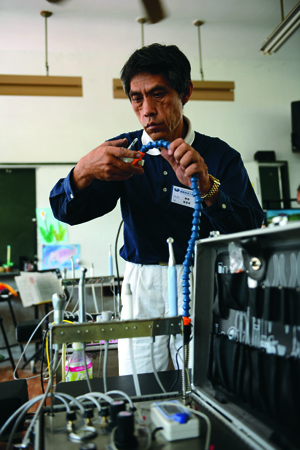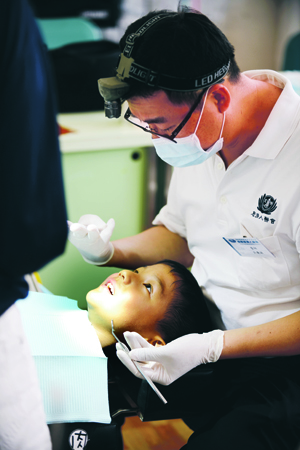

| The Gentle Hands of a Doctor: Soothing the Old and the Young | |||||||||
| By Zhang Jing-mei Translated by Tang Yau-yang Photos by Chen Yu-yan | |||||||||
Taoyuan and Liugui districts in Kaohsiung, southern Taiwan, are vast but remote. Because breadwinners largely work out of town, most residents there are either old or young. Getting medical treatment is inconvenient for them, so members of the Tzu Chi International Medical Association take the services to them.
Every Tooth Counts
Dentists clean old people’s teeth, and volunteers teach children how to correctly brush their teeth. For these volunteer helpers, oral hygiene care is important because every tooth counts.
There are not many jobs around Taoyuan and Liugui districts in Kaohsiung, southern Taiwan. These mountainous areas are spread out and off the beaten track, so most people there have to go out of town for work. Since Typhoon Morakot devastated the areas in 2009, tourism has been in a slump, further driving workers away. The regions are therefore left largely with just the old and the young. Getting medical treatment is inconvenient for these people, so they tend to put off seeing doctors. To fill the gap, members of the Kaohsiung chapter of the Tzu Chi International Medical Association (TIMA) take medical services to where these people live so they may be cared for right in their own communities. For example, they hold monthly free clinics at Baolai Elementary School in Baolai, Liugui. One such clinic was conducted on April 27, 2014. When TIMA doctors, nurses, pharmacists, and support volunteers arrived in Baolai that day, they got tied up in throngs of people and traffic for a temple fair. After some effort, they finally wove through the street and reached the school. An advance team had already gotten there and set up the equipment that the clinic would need. The noise of firecrackers from the fair was close and inescapable, but still all the volunteers gathered in a hallway to pray. Some were moved to tears during the prayer. A serene aura seemed to have descended and insulated them from the car horns, firecrackers, and clamor of the fairgoers outside. When the volunteers were finished, they settled down and got ready to open the clinic.
Follow-up Volunteer nurse Lai Ling-yin (賴玲吟) stood at a corner of the school, making phone calls. Holding a stack of lab reports on the Pap smear specimens that had been taken from some local women during her previous visit, she was calling the women to come to the elementary school and pick up their results, but none of her calls was answered. This being the harvest season for Chinese plums, most people in this mountain village had probably gone to pick them. Lai began to feel a little anxious because some of the reports showed worrisome numbers, and she wanted to let these women know so they could get follow-up treatment without undue delay. She continued to call, and finally she got through and talked to all the women. After her last call, she raised her head and saw a feeble old woman with unsteady gait standing at the check-in counter, where a volunteer was holding her medical chart and asking her questions. The old woman, however, did not seem to be paying attention to the volunteer. With a blank look on her face, she just kept murmuring, “My legs hurt really bad….” Lai hurried over and talked into her ear: “I’ll help you register for the rehab clinic, and your legs will feel better.” The medical chart indicated that the woman was 79 years old, so Lai asked the volunteer to also set her up for internal medicine and an abdominal ultrasound. When the volunteer rushed off to make those appointments, Lai led the woman, her mouth red from chewing betel nuts, to the dental clinic.
A classroom turned dental clinic Early that morning, volunteers on the advance team set up a rather complete dental clinic in a classroom with all the instruments, adjustable chairs, and even adjustable surgical headlights ready for use.
Dr. Wu Ching-yuan (吳慶源), one of the TIMA dentists, had had a cold for days. On the day of the free clinic, he could hardly speak. As soon as the woman brought by volunteer Lai sat down in the chair in front of him, he could easily tell that the old woman was a habitual betel nut chewer because of the indelible telltale signs—the fibrous residues of betel nuts in her mouth and stains from the reddish-purple betel nut juice.
Betel nut chewers run a high risk of oral cancer. Dr. Wu wanted to advise the woman to ease off on that unhealthy habit, but he did it quite tactfully. “Your skin looks nice,” he said to her. She gave him a big smile, obviously pleased. “You’d look even more beautiful if your teeth were cleaner and brighter,” Wu continued.
He began cleaning the woman’s teeth. Despite the high-pitched noise of scaling plaque from her teeth—a sound that many people dread—she appeared completely at ease.
“You chew quite a lot of betel nuts, right?” Wu gently asked her. “And smoke a lot of cigarettes, too?”
The woman stammered as she tried to defend herself: “Er, er,…no…it’s just…tough, you know, to kick these habits.” Wu did not press. “Can you cut down just one betel nut and one cigarette a day?” he carried on, as if cajoling a child.
After finishing his job, Wu turned the patient over to Lai. Now it was time for another aspect of oral hygiene: brushing the teeth. Lai used a toothbrush on the knuckles of her fingers to show the woman how to brush the right way.
Just then a stir occurred in the room. A power surge had caused the circuit breaker to trip. Volunteers rushed over to check. Dr. Wu and another dentist, Cai Yuan-hong (蔡元弘), apologized to their patients, whose mouths were wide open for treatment. The power was soon restored and everything returned to normal.
“Eh, why isn’t the water flowing?” someone said. No water was coming out of a tube for teeth cleaning. Volunteers again rushed to check. They adjusted the jungle of tubes and wires this way and that, and sure enough, the flow resumed right away.
“We really can’t do without these versatile helpers,” Wu said of those volunteers. He added that of all the medical specialties, the dental clinic is the most instrument-intensive and thus the most complicated to set up. It requires a lot of support personnel to run smoothly, and treating dental patients is also the most time-consuming of all services. Often at a free clinic, when lunch time comes and everyone is eating, only those who serve in the dental clinic are still working.
Wu went on to see another female patient. This woman was a petite 80-year-old, but she spoke vigorously with a resonant voice. However, she was not doing too well as far as her teeth were concerned: She had just three left, and two of them hurt, which made her restless. “I pray that all three will fall out so they won’t hurt anymore,” she told Dr. Wu.
Wu carefully examined her all the same—every tooth was important to him.
Most dental patients at the free clinic are old, and their teeth are mostly in worse than bad shape, like this three-toothed 80-year-old. Yet even though most of their teeth are past praying for, Wu, who has participated in these Tzu Chi free clinics for six years, still feels that every visit to this village is well worth it. Dental treatment is a time-consuming process that requires frequent visits to dentists, which can be a challenge to older folks in the mountains because of factors such as their limited mobility. That is why they simply skip treatment and suffer. Compared to them, the TIMA members are much more mobile. Visiting the village every month and treating these old people can at least help ease the discomfort caused by toothaches and keep their remaining teeth healthier. “We use our mobility to bring dental service to them. That’s what we as doctors should do,” Wu remarked.
Young teeth Chen Song-hong (陳松宏), 6, stood outside the clinic timidly looking in at Gao Han-sen (高韓森), 8, who was lying in a dental chair as Dr. Wu examined his teeth. Chen’s mother was selling peaches in front of Baolai Elementary School while the free clinic was underway inside the school. She really wanted to know whether her son had cavities or not, but she was too busy to attend to that. To help her out, a volunteer took her little boy to Dr. Wu. The boy tried several times to just walk off because he was scared—until he saw Gao, a friend of his, in the chair. “What’s Gao Han-sen holding?” Chen asked. “A mirror,” Dr. Wu said. “For what?” “So he can see if any of his teeth have turned black.” “If I sit there, can I hold the mirror, too?” Chen was interested in the mirror. Perhaps he was curious about how his mouth would look under the spotlight. “Sure thing,” the doctor said. That settled Chen down, and he waited patiently for his turn. Finally, Gao was done. During the treatment process, the eight-year-old did not so much as frown. The adults piled praise on him as he climbed off the chair. Gao proudly told Chen, as if he himself were a hero, “It didn’t hurt at all; it only tingled a little.” With that assurance, Chen hopped bravely on the chair, also like a hero. Volunteers cheered him on. He grasped the mirror tightly as Dr. Wu started working on him.
A short while later, several children showed up outside the dental clinic. One of them spoke up: “The principal told us we could come here if we wanted our teeth checked.” Principal Ke Hui-ling (柯惠玲) has been supportive of the Tzu Chi free clinics. Aside from providing the school as a clinic venue, she reminds the students at their morning assemblies about the free medical service. These six- and seven-year-olds sat quietly in the waiting area. Lai Ling-yin gave each of them a new toothbrush, squatted down to be at their height, and showed them the correct way to brush their teeth. “I feel like they’re my own children,” Lai said. Looking at them, she became a little emotional—she wanted to hold every one of them tight. Though her legs were numb from squatting, she could not have been happier. A person cannot be healthy without first having healthy teeth. She was glad to spread information on oral hygiene. She very much hoped that each child would grow up healthy. “Brush this side, and then the other side.” “Brush the right side with your right hand and the left side with your left hand.” “Brush two teeth at a time.” “Do it gently.” The children repeated Lai’s instructions in earnest. It was close to noon and the boisterous crowds of the temple fair had long gone. All that was left was a breeze wafting under the blue sky, lightly stirring tree leaves. This half-day clinical outreach would come to an end after all the remaining patients were treated, but the TIMA members were sure to come back in about a month to help patients get rid of their aches and pains, get healthier teeth, or hang on to their last few teeth. |















|






